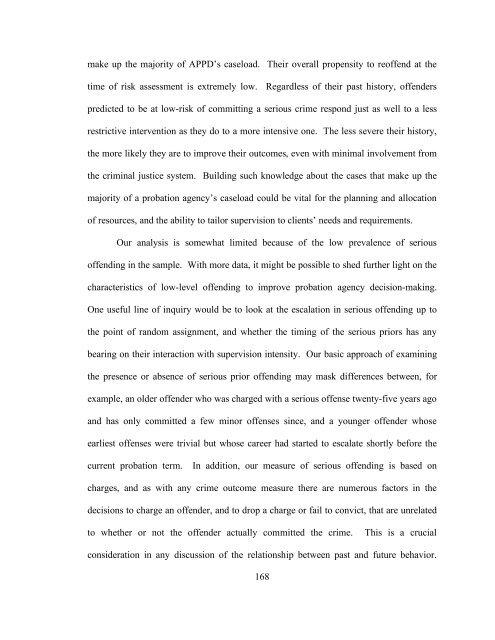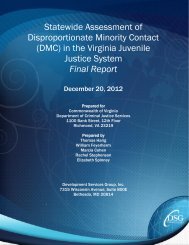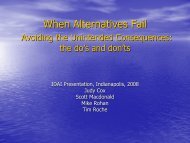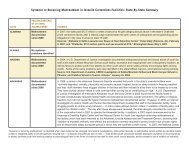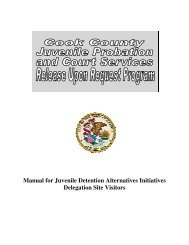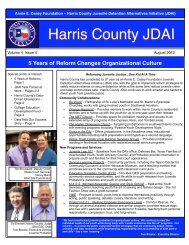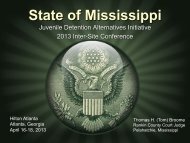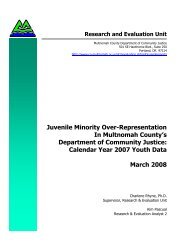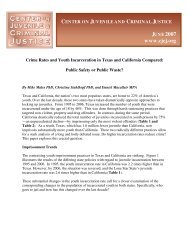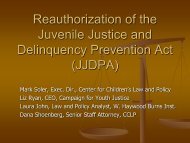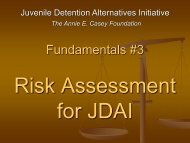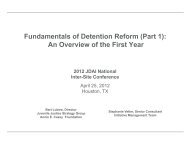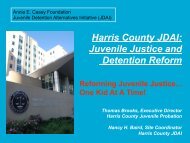The Effects of Sanction Intensity on Criminal Conduct - JDAI Helpdesk
The Effects of Sanction Intensity on Criminal Conduct - JDAI Helpdesk
The Effects of Sanction Intensity on Criminal Conduct - JDAI Helpdesk
Create successful ePaper yourself
Turn your PDF publications into a flip-book with our unique Google optimized e-Paper software.
make up the majority <str<strong>on</strong>g>of</str<strong>on</strong>g> APPD’s caseload. <str<strong>on</strong>g>The</str<strong>on</strong>g>ir overall propensity to re<str<strong>on</strong>g>of</str<strong>on</strong>g>fend at the<br />
time <str<strong>on</strong>g>of</str<strong>on</strong>g> risk assessment is extremely low. Regardless <str<strong>on</strong>g>of</str<strong>on</strong>g> their past history, <str<strong>on</strong>g>of</str<strong>on</strong>g>fenders<br />
predicted to be at low-risk <str<strong>on</strong>g>of</str<strong>on</strong>g> committing a serious crime resp<strong>on</strong>d just as well to a less<br />
restrictive interventi<strong>on</strong> as they do to a more intensive <strong>on</strong>e. <str<strong>on</strong>g>The</str<strong>on</strong>g> less severe their history,<br />
the more likely they are to improve their outcomes, even with minimal involvement from<br />
the criminal justice system. Building such knowledge about the cases that make up the<br />
majority <str<strong>on</strong>g>of</str<strong>on</strong>g> a probati<strong>on</strong> agency’s caseload could be vital for the planning and allocati<strong>on</strong><br />
<str<strong>on</strong>g>of</str<strong>on</strong>g> resources, and the ability to tailor supervisi<strong>on</strong> to clients’ needs and requirements.<br />
Our analysis is somewhat limited because <str<strong>on</strong>g>of</str<strong>on</strong>g> the low prevalence <str<strong>on</strong>g>of</str<strong>on</strong>g> serious<br />
<str<strong>on</strong>g>of</str<strong>on</strong>g>fending in the sample. With more data, it might be possible to shed further light <strong>on</strong> the<br />
characteristics <str<strong>on</strong>g>of</str<strong>on</strong>g> low-level <str<strong>on</strong>g>of</str<strong>on</strong>g>fending to improve probati<strong>on</strong> agency decisi<strong>on</strong>-making.<br />
One useful line <str<strong>on</strong>g>of</str<strong>on</strong>g> inquiry would be to look at the escalati<strong>on</strong> in serious <str<strong>on</strong>g>of</str<strong>on</strong>g>fending up to<br />
the point <str<strong>on</strong>g>of</str<strong>on</strong>g> random assignment, and whether the timing <str<strong>on</strong>g>of</str<strong>on</strong>g> the serious priors has any<br />
bearing <strong>on</strong> their interacti<strong>on</strong> with supervisi<strong>on</strong> intensity. Our basic approach <str<strong>on</strong>g>of</str<strong>on</strong>g> examining<br />
the presence or absence <str<strong>on</strong>g>of</str<strong>on</strong>g> serious prior <str<strong>on</strong>g>of</str<strong>on</strong>g>fending may mask differences between, for<br />
example, an older <str<strong>on</strong>g>of</str<strong>on</strong>g>fender who was charged with a serious <str<strong>on</strong>g>of</str<strong>on</strong>g>fense twenty-five years ago<br />
and has <strong>on</strong>ly committed a few minor <str<strong>on</strong>g>of</str<strong>on</strong>g>fenses since, and a younger <str<strong>on</strong>g>of</str<strong>on</strong>g>fender whose<br />
earliest <str<strong>on</strong>g>of</str<strong>on</strong>g>fenses were trivial but whose career had started to escalate shortly before the<br />
current probati<strong>on</strong> term.<br />
In additi<strong>on</strong>, our measure <str<strong>on</strong>g>of</str<strong>on</strong>g> serious <str<strong>on</strong>g>of</str<strong>on</strong>g>fending is based <strong>on</strong><br />
charges, and as with any crime outcome measure there are numerous factors in the<br />
decisi<strong>on</strong>s to charge an <str<strong>on</strong>g>of</str<strong>on</strong>g>fender, and to drop a charge or fail to c<strong>on</strong>vict, that are unrelated<br />
to whether or not the <str<strong>on</strong>g>of</str<strong>on</strong>g>fender actually committed the crime.<br />
This is a crucial<br />
c<strong>on</strong>siderati<strong>on</strong> in any discussi<strong>on</strong> <str<strong>on</strong>g>of</str<strong>on</strong>g> the relati<strong>on</strong>ship between past and future behavior.<br />
168


